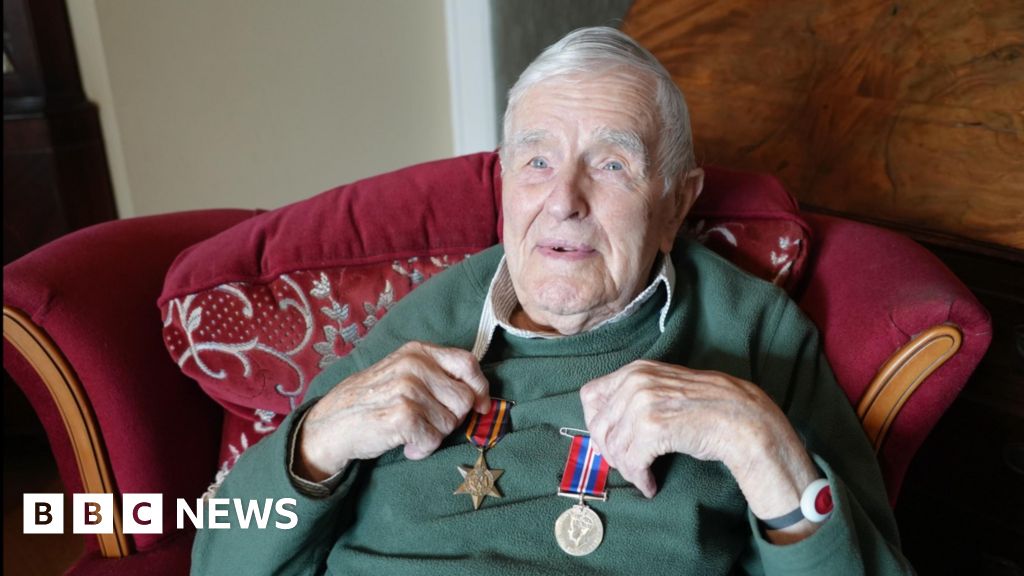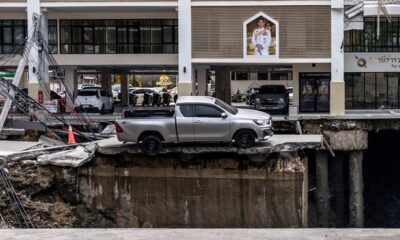Politics
Veteran Recalls Hiroshima’s Horrors 80 Years After Atomic Bomb

Duncan Hilling, a 99-year-old World War II veteran, vividly recalls the devastation he witnessed in Hiroshima and Nagasaki following the atomic bombings in 1945. Hilling, one of the first British soldiers to arrive in Japan after the attacks, received a letter of thanks from Eluned Morgan, the First Minister of Wales, in recognition of his service and sacrifice as the world marks 80 years since Victory over Japan Day.
As a soldier with the Royal Welch Fusiliers, Hilling described the horrifying scenes he encountered. On August 6, 1945, the American B-29 bomber, the Enola Gay, dropped the atomic bomb known as Little Boy over Hiroshima. This bomb unleashed the equivalent of 15,000 tonnes of TNT, decimating a five-square-mile area and leading to an estimated 140,000 deaths among Hiroshima’s population of 350,000.
Hilling’s account is haunting. He remembers, “We went to Hiroshima and saw the horror of the atomic bomb. Blind people were being led around, and there were still dead bodies lying in the streets.” Despite the devastation, Japan did not surrender immediately. Just three days later, a second atomic bomb was dropped on Nagasaki, resulting in an additional 74,000 deaths. Japan officially surrendered on August 14, 1945.
During his time in Japan, Hilling and his regiment visited makeshift hospitals set up in schools. “We saw people who were totally blind, and their hands and skin were burnt,” he recalled. The impact of the bombings extended beyond immediate casualties, as many survivors suffered from radiation sickness in the years that followed.
Hilling pointed out that the long-term effects of radiation were not fully understood at the time. He lost several comrades from his regiment years later, who had collected souvenirs from the bomb sites. “I didn’t take any souvenirs, but nobody ever mentioned the fact that radiation was a problem,” he said. Tragically, three of his friends died from cancer in their 30s and 40s, likely linked to their exposure.
In the wake of Japan’s surrender, celebrations erupted across the UK, US, and Australia, with two days of national holidays. Hilling celebrated in India before heading to Japan, where his regiment sang hymns in a unique display of joy. “We sang Cwm Rhondda, it was very exciting to celebrate it in that way,” he said, reflecting on the camaraderie of his fellow soldiers.
Following his service in Japan, Hilling was deployed to Malaya during the Malayan Emergency, a conflict marked by a communist insurgency. He described the fear of navigating the jungle, where danger lurked at every turn.
Eluned Morgan’s letter of thanks acknowledged Hilling’s contributions and highlighted the importance of remembering such sacrifices. “It was the end of a really difficult time, and it was lovely to hear Duncan talk about the joy when they heard the end of the war had occurred,” she noted. Morgan emphasized the need to educate younger generations about the costs of war and the value of listening to firsthand accounts like Hilling’s.
As the world reflects on the legacy of the atomic bombings and their profound impact, Hilling’s memories serve as a poignant reminder of the horrors of war and the enduring hope for peace.
-

 Health1 month ago
Health1 month agoFiona Phillips’ Husband Shares Heartfelt Update on Her Alzheimer’s Journey
-

 Health1 month ago
Health1 month agoNeurologist Warns Excessive Use of Supplements Can Harm Brain
-

 World1 month ago
World1 month agoCole Palmer’s Cryptic Message to Kobbie Mainoo Following Loan Talks
-

 Entertainment3 months ago
Entertainment3 months agoLove Island Star Toni Laite’s Mother Expresses Disappointment Over Coupling Decision
-

 Entertainment2 months ago
Entertainment2 months agoMajor Cast Changes at Coronation Street: Exits and Returns in 2025
-

 Entertainment2 months ago
Entertainment2 months agoMasterChef Faces Turmoil as Tom Kerridge Withdraws from Hosting Deal
-

 World2 weeks ago
World2 weeks agoMassive Sinkhole Opens in Bangkok, Swallowing Cars and Causing Chaos
-

 World3 weeks ago
World3 weeks agoMichelle Tsiakkas Opens Up About Jamie Borthwick Before BBC Exit
-

 Lifestyle2 months ago
Lifestyle2 months agoEngland Flags Spark Controversy This Summer: A Cultural Debate
-

 Entertainment3 months ago
Entertainment3 months agoWoman Transforms Life with Boot Camp, Losing Nearly 9 Pounds in a Week
-

 World1 month ago
World1 month agoCoronation Street’s Asha Alahan Faces Heartbreaking Assault
-

 Entertainment3 months ago
Entertainment3 months agoColeen Nolan Reflects on Family Tragedy and Reconciliation









